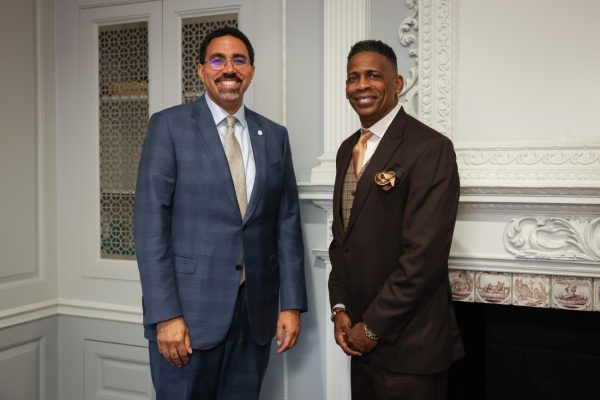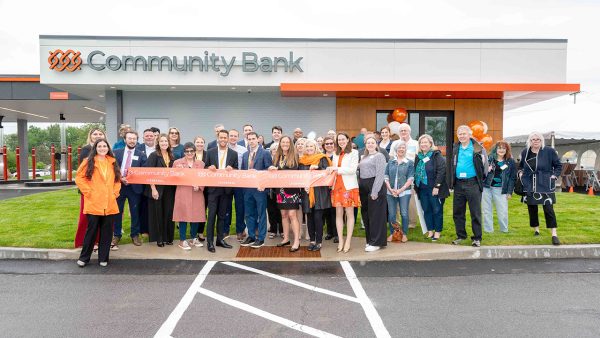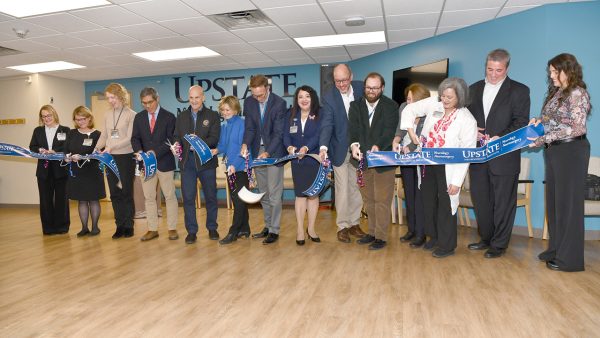Get our email updates
Stay up-to-date on the companies, people and issues that impact businesses in Syracuse, Central New York and beyond.
What's New
Upcoming Events
CNYBJ Job Board

Landmark Theatre launches $8.7 million Centennial Campaign, dedicates marquee to Magnarelli family
SYRACUSE, N.Y. — The Landmark Theatre has started the public phase of its $8.7 million Centennial Campaign ahead of the downtown Syracuse venue’s 100th year. The campaign seeks to raise the final $1.8 million of its $8.7 million goal, following a successful silent phase that brought in the majority of funds through the support of […]
Get Instant Access to This Article
Become a Central New York Business Journal subscriber and get immediate access to all of our subscriber-only content and much more.
- Critical Central New York business news and analysis updated daily.
- Immediate access to all subscriber-only content on our website.
- Get a year’s worth of the Print Edition of The Central New York Business Journal.
- Special Feature Publications such as the Book of Lists and Revitalize Greater Binghamton, Mohawk Valley, and Syracuse Magazines
Click here to purchase a paywall bypass link for this article.
SYRACUSE, N.Y. — The Landmark Theatre has started the public phase of its $8.7 million Centennial Campaign ahead of the downtown Syracuse venue’s 100th year.
The campaign seeks to raise the final $1.8 million of its $8.7 million goal, following a successful silent phase that brought in the majority of funds through the support of lead donors, foundations, and public partners.
Community members are now invited to join this effort to ensure the Landmark’s next century “shines as brightly as its first,” the Landmark Theatre said.
Stephanie Crockett, CEO of Syracuse–based advertising and marketing firm Mower, and Andy Breuer, president of Hueber-Breuer Construction Company, are serving as the campaign co-chairs.
Funds raised through the Centennial Campaign will support a range of improvements to the theatre’s facilities, including completion of the auditorium restoration; air-conditioning system upgrades; exterior door rehabilitation; and carpet replacement.
Supporters can learn more and contribute to the campaign at www.landmark100.org. Those interested can pledge donations over a period of three to five years, the organization noted.
In his remarks at a Friday event to launch the public phase of the Landmark’s Centennial Campaign, Mike Intaglietta, executive director of the Landmark Theatre, recognized local lawmakers, members of the organization’s board of trustees, both past and present, the Landmark Theatre’s Centennial committee, and the theatre’s staff.
“The dedication and talent of our team do not get called out nearly enough, from production to ticketing to operations, concessions, security and our volunteer ushers, some of whom have helped us here today, and especially our leadership team,” Intaglietta said. “They work long and exceptionally odd hours, and I regularly see them go above and beyond to make sure our guests at the theatre have an unparalleled experience”
Intaglietta spoke to a gathering that was seated on the stage looking out at the theatre’s lower and upper seating areas.
The event, attended by nearly 200 community members and supporters, also featured the dedication of the Magnarelli Marquee, honoring the Magnarelli family’s enduring commitment to the theatre and to Syracuse’s cultural life.
Carrie Lazarus, with WSYR-TV NewsChannel 9, emceed the event, which included remarks from Onondaga County Executive Ryan McMahon and Syracuse Mayor-elect Sharon Owens, each voicing their support for the campaign and the Landmark’s continued importance to Central New York.
Opened in 1928 as the Loew’s State Theatre, the grand movie palace quickly became a “treasured” gathering place for Central New Yorkers. When it fell into disrepair in the 1970s, a dedicated group of citizens formed a nonprofit organization to save what was renamed the Landmark Theatre and make it one of the region’s “most vital cultural institutions.” Today, the Landmark hosts world-class touring concerts, Broadway shows, comedians, and community events, contributing more than $9.6 million annually to the local economy.

Watertown airport formally opens new terminal
HOUNSFIELD, N.Y. — Watertown International Airport on Friday formally opened its new terminal. The 25,000-square-foot terminal was built as part of an ongoing redevelopment of

SUNY appoints next president of Corning Community College
CORNING, N.Y. — The SUNY board of trustees voted Friday to name Terence Finley as the eighth president of Corning Community College. Finley — who

O’Connell to retire as director of the Allyn Family Foundation; successor named
SYRACUSE, N.Y. — Meg O’Connell, executive director of the Allyn Family Foundation, says she will retire at the end of 2025. O’Connell announced her intention to retire in an email message on Thursday. She forwarded the communication to CNYBJ. “Rarely does a person wake up every day and love their job as much as I
Get Instant Access to This Article
Become a Central New York Business Journal subscriber and get immediate access to all of our subscriber-only content and much more.
- Critical Central New York business news and analysis updated daily.
- Immediate access to all subscriber-only content on our website.
- Get a year’s worth of the Print Edition of The Central New York Business Journal.
- Special Feature Publications such as the Book of Lists and Revitalize Greater Binghamton, Mohawk Valley, and Syracuse Magazines
Click here to purchase a paywall bypass link for this article.
SYRACUSE, N.Y. — Meg O’Connell, executive director of the Allyn Family Foundation, says she will retire at the end of 2025.
O’Connell announced her intention to retire in an email message on Thursday. She forwarded the communication to CNYBJ.
“Rarely does a person wake up every day and love their job as much as I have. It has been a privilege to work alongside a deeply committed Board of Directors and an extraordinary team that brings heart and integrity to every decision we make. Together, we’ve learned that real impact happens when we come together as a community to challenge inequities and create opportunities,” O’Connell wrote.
She has served as executive director from 1994-1998, 2001-2012, and from 2013 until now. From 2012-2013, O’Connell served as interim president of Onondaga Community College and from 1998-2000, O’Connell and her family lived in London, England, per her biography on the website of the Allyn Family Foundation.
O’Connell’s efforts have included spearheading the founding of a new nonprofit entity, the Syracuse Urban Partnership, that constructed the Salt City Market in downtown Syracuse, per her biography on the website of the Allyn Family Foundation.
New leader
The Allyn Family Foundation’s board of directors has selected Maarten Jacobs as the next executive director, effective Jan. 1, 2026. Since 2019, Jacobs has served as director of community prosperity at the Allyn Family Foundation.
In that role, he oversaw the design, construction, and management of the Salt City Market, as well as the renovation of the Chimes building in downtown Syracuse, O’Connell wrote in the email.
“As I step aside, I do so with immense gratitude and full confidence in the Foundation’s future,” she noted in the message.

BiRed Imaging wins $10K Rothschild Award for AI-powered breast-cancer screening technology
SYRACUSE, N.Y. — BiRed Imaging Inc. on Wednesday night was selected as the winner of the $10,000 Alan W. Rothschild Innovation Award at the Biotech

Community Bank expands footprint in Pennsylvania’s Greater Lehigh Valley
DeWITT, N.Y. — The deal was first announced back in June, and on Nov. 10, Community Bank, N.A. said it had completed its acquisition of seven branch locations from Santander Bank, N.A. in the Allentown, Pennsylvania area. Community Bank is a wholly owned banking subsidiary of Community Financial System, Inc. (NYSE: CBU), which is headquartered
Get Instant Access to This Article
Become a Central New York Business Journal subscriber and get immediate access to all of our subscriber-only content and much more.
- Critical Central New York business news and analysis updated daily.
- Immediate access to all subscriber-only content on our website.
- Get a year’s worth of the Print Edition of The Central New York Business Journal.
- Special Feature Publications such as the Book of Lists and Revitalize Greater Binghamton, Mohawk Valley, and Syracuse Magazines
Click here to purchase a paywall bypass link for this article.
DeWITT, N.Y. — The deal was first announced back in June, and on Nov. 10, Community Bank, N.A. said it had completed its acquisition of seven branch locations from Santander Bank, N.A. in the Allentown, Pennsylvania area.
Community Bank is a wholly owned banking subsidiary of Community Financial System, Inc. (NYSE: CBU), which is headquartered in DeWitt.
The acquisition — which adds about $553 million in customer-deposit accounts — strengthens the bank’s ability to provide service to consumer, business banking, and private banking clients in Pennsylvania’s Greater Lehigh Valley while growing its presence and acquiring new customers.
“We are delighted to welcome the employees and customers of these seven branches to Community Bank. Our commitment is to ensure a smooth transition and deliver the exceptional service our customers expect from the same dedicated team of professionals they have come to know and trust,” Dimitar Karaivanov, president and CEO of Community Financial System, said in the announcement. “We look forward to building lasting relationships and supporting the Greater Lehigh Valley community with trusted, personalized banking.”
This acquisition accelerates Community Bank’s expansion in the Greater Lehigh Valley, complementing its existing commercial and consumer-lending presence in the market. With the addition of these branches and the recently opened and pending de novo locations, Community Bank will operate a total of 12 retail locations in the Greater Lehigh Valley, securing a top 5 market position, the bank said.
About Community Financial System
Community Financial System is a financial-services company that is focused on four main business lines that include banking, employee benefits, insurance, and wealth-management services.
Its banking subsidiary, Community Bank, is among the country’s 100 largest banking institutions with more than $16 billion in assets. It operates about 200 branches across upstate New York, northeastern Pennsylvania, Vermont, and western Massachusetts.
The company’s Benefit Plans Administrative Services, Inc. subsidiary is a provider of employee-benefits administration, trust services, collective investment-fund administration, and actuarial-consulting services to customers on a national scale.
The company’s OneGroup NY, Inc. subsidiary is a top 68 U.S. insurance agency, the company noted.

New STEM fellowship program at the MOST has Micron support
SYRACUSE, N.Y. — It’s a program designed to “inspire and support the next generation of innovators” in Central New York. The Micron Teacher Fellowship at the Milton J. Rubenstein Museum of Science & Technology (MOST) is a hands-on STEM program. STEM is short for science, technology, engineering, and mathematics. The MOST and the Micron Foundation
Get Instant Access to This Article
Become a Central New York Business Journal subscriber and get immediate access to all of our subscriber-only content and much more.
- Critical Central New York business news and analysis updated daily.
- Immediate access to all subscriber-only content on our website.
- Get a year’s worth of the Print Edition of The Central New York Business Journal.
- Special Feature Publications such as the Book of Lists and Revitalize Greater Binghamton, Mohawk Valley, and Syracuse Magazines
Click here to purchase a paywall bypass link for this article.
SYRACUSE, N.Y. — It’s a program designed to “inspire and support the next generation of innovators” in Central New York.
The Micron Teacher Fellowship at the Milton J. Rubenstein Museum of Science & Technology (MOST) is a hands-on STEM program. STEM is short for science, technology, engineering, and mathematics.
The MOST and the Micron Foundation announced its launch on Oct. 30.
The Micron Foundation is the philanthropic arm of Boise, Idaho–based Micron Technology, Inc. (NASDAQ: MU), which plans to build a massive semiconductor-manufacturing campus at the White Pine Commerce Park along Route 31 in the town of Clay.
The new initiative is a first of its kind for the Central New York (CNY) community and made possible by a $100,000 grant from the Micron Foundation, the MOST said in its announcement. It will pay for year-long fellowships for two Central New York STEM educators.
Fellows will deliver programming and provide support in the areas of semiconductor and STEM education at K-12 schools, MOST programs and exhibits, and other key community events. They will also continue in their full-time positions with area school districts during the course of their fellowship.
“This is a transformational moment for STEM education in our region,” Lauren Kochian, president of the MOST, said in the museum’s announcement. “These fellowships will help us reach more students and deliver unforgettable experiences that make STEM come alive around their communities, and within the walls of the MOST. We’re thrilled to expand our partnership with Micron on this groundbreaking initiative.”
Inaugural fellows
The program’s inaugural fellows — Alexis Williams from Syracuse and Brian Heffron from Clay — were selected for their leadership in STEM education and their “commitment to inspiring the next generation of innovators in CNY.”
Williams is a technology educator at North Syracuse Central School District, where she has led hands-on STEM and robotics instruction for middle and high-school students. Williams has played a key role in developing curriculum for the Advanced Technology Framework, a “ground-breaking” curriculum-development partnership between Micron and educators’ unions that aims to broaden STEM and career and technical-education offerings in New York state, the MOST said.
Williams holds a bachelor’s degree in technology education from SUNY Oswego and a master’s degree in curriculum development and instructional technology from SUNY Albany.
Formerly an instructor and principal at Oswego County P-TECH, Heffron is the administrator of workforce development and community relations at CiTi BOCES, where he leads county-wide STEM and workforce-readiness initiatives.
With more than 14 years of experience in career and technical education, he has developed numerous STEM programs for local K-12 students. Heffron holds degrees from Middle Tennessee State University, the College of Saint Rose, and Le Moyne College, and is also certified as a New York State School District Leader.
“Micron’s partnership with the MOST, which began in 2023, has already introduced semiconductors and advanced manufacturing in an engaging and accessible way to tens of thousands of Central New York students,” April Arnzen, executive VP and chief people officer at Micron and president of the Micron Foundation, said in the MOST announcement. “This new fellowship program will afford young people in the region even more opportunities to learn, explore, and see a future for themselves in the semiconductor industry by engaging with leaders already known in the academic community.”
The fellowship expands the growing partnership between Micron and the MOST and reflects a shared mission to prepare students for careers in the rapidly expanding semiconductor industry in Central New York. Most notably, the 1,500-square-foot interactive DECONSTRUCTED exhibit presented by Micron is a guide through the hidden world of microchips and how they power the world around us.
The MOST and Micron also have partnered to present programming such as Micron’s Going Tech and Chip Camp offerings for area children.
“This fellowship program is about making STEM both exciting and accessible [relatable] for young people in Central New York,” Rosita Najmi, head of global social impact and community engagement at Micron, and executive director of the Micron Foundation, said in the announcement. “We want students to see themselves in these STEM careers, and we believe the MOST, and these local, trusted and seasoned educators and subject matter experts are the ideal partners to make that vision a reality.”

Area private schools to receive funds for on-campus projects
ALBANY, N.Y. — State funding for on-campus projects is coming to 35 private colleges and universities, including Syracuse University, Le Moyne College, Cornell University, and Clarkson University. The state awarded a total of $49 million through the Higher Education Capital Matching Grant Program (HECap). The funding supports projects that will upgrade facilities, create modern laboratory
Get Instant Access to This Article
Become a Central New York Business Journal subscriber and get immediate access to all of our subscriber-only content and much more.
- Critical Central New York business news and analysis updated daily.
- Immediate access to all subscriber-only content on our website.
- Get a year’s worth of the Print Edition of The Central New York Business Journal.
- Special Feature Publications such as the Book of Lists and Revitalize Greater Binghamton, Mohawk Valley, and Syracuse Magazines
Click here to purchase a paywall bypass link for this article.
ALBANY, N.Y. — State funding for on-campus projects is coming to 35 private colleges and universities, including Syracuse University, Le Moyne College, Cornell University, and Clarkson University.
The state awarded a total of $49 million through the Higher Education Capital Matching Grant Program (HECap). The funding supports projects that will upgrade facilities, create modern laboratory and research spaces, and invest in instructional technology and equipment, the office of Gov. Kathy Hochul said in the Oct. 24 announcement.
When combined with the colleges’ matching funds, more than $195 million will be invested in New York’s higher-education communities through this round of awards.
The awards are “ensuring that New York’s higher education institutions remain at the forefront of innovation and opportunity,” Hochul’s office said.
Funding awards
With its announcement, the state provided a list of all the schools that were awarded, the dollar amounts, and how the schools will use the grant awards.
The state awarded Syracuse University more than $1.5 million for renovations to Grant Auditorium including upgrades to its technology and the heating, ventilation, and air conditioning system.
Cornell University in Ithaca will use its $1.75 million award for renovations to its library.
The state awarded Clarkson University in Potsdam $5 million for the first phase of renovations to the Engineering and Science Complex.
Hobart and William Smith Colleges in Geneva will use a $5 million award for the construction of a new science building and adjacent science facilities.
In addition, LeMoyne College in Syracuse will use an award of more than $611,000 for the purchase of technology equipment.
Keuka College will use more than $60,000 to help pay for the purchase of furniture and equipment, including the purchase of a vehicle.
The state awarded Alfred University in Alfred more than $198,000 for the purchase of equipment for the Saxon Hill Athletics Complex.

Upstate Neurological Institute brings experts together under one roof
SYRACUSE, N.Y. — Upstate Medical University says the new Upstate Neurological Institute brings “all of its brain and nervous system experts together under one roof.” It’s located on the second floor of the Upstate Health Care Center at 90 Presidential Plaza in Syracuse. Nearly 50 physicians, all members of the Upstate Medical University faculty, serve
Get Instant Access to This Article
Become a Central New York Business Journal subscriber and get immediate access to all of our subscriber-only content and much more.
- Critical Central New York business news and analysis updated daily.
- Immediate access to all subscriber-only content on our website.
- Get a year’s worth of the Print Edition of The Central New York Business Journal.
- Special Feature Publications such as the Book of Lists and Revitalize Greater Binghamton, Mohawk Valley, and Syracuse Magazines
Click here to purchase a paywall bypass link for this article.
SYRACUSE, N.Y. — Upstate Medical University says the new Upstate Neurological Institute brings “all of its brain and nervous system experts together under one roof.”
It’s located on the second floor of the Upstate Health Care Center at 90 Presidential Plaza in Syracuse. Nearly 50 physicians, all members of the Upstate Medical University faculty, serve the Institute.
The new Neurological Institute streamlines care, improves patient access to specialists, and enhances collaboration between neurologists and neurosurgeons on complex cases, Upstate contends. By housing these experts together, Upstate aims to deliver the region’s “most advanced and coordinated” neurological care.
The Institute is also expected to boost recruitment of top neurosurgeons and neurologists while “elevating Upstate’s national and international profile,” the organization stipulates.
“Bringing neurology and neurosurgery together in one coordinated, collaborative environment allows us to deliver the full spectrum of brain-health care — from diagnosis through surgery to recovery — with continuity, clarity and speed,” Dr. Luis Mejico, chair of neurology at Upstate Medical University, said in the announcement.
Under the new configuration, neurosurgery has relocated from several sites across campus to join neurology in a newly renovated space spanning more than 20,000 square feet. The facility doubles the number of exam rooms — from 23 to 49 — and includes a modern nursing unit, physician offices, and dedicated telehealth suites for patients who face travel challenges.
In addition to neurosurgical and neurological services, the Upstate Neurological Institute also offers on-site services such as physical and occupational therapies, social work, genetics, and respiratory services.
The Neurological Institute also includes the Upstate Comprehensive Stroke Center and the regional Telestroke Network, which supports stroke care at a dozen hospitals across New York.
“The creation of this Institute signals to patients that Upstate offers a true one-stop shop for neurological care — with an integration of services not found anywhere else,” Dr. Robert Corona, CEO of Upstate University Hospital, said. Corona also serves as the John B. Henry Professor of Pathology and senior associate dean of the Norton College of Medicine.

Hartwick provost to become school’s next president in July 2026
ONEONTA, N.Y. — The VP for academic affairs and provost at Hartwick College in Oneonta will become the school’s 13th president in mid-2026. The college’s board of trustees on Nov. 10 said it chose Laurel Bongiorno, who will assume the presidency on July 1, 2026. Bongiorno will succeed James Mullen, Jr., who has served as
Get Instant Access to This Article
Become a Central New York Business Journal subscriber and get immediate access to all of our subscriber-only content and much more.
- Critical Central New York business news and analysis updated daily.
- Immediate access to all subscriber-only content on our website.
- Get a year’s worth of the Print Edition of The Central New York Business Journal.
- Special Feature Publications such as the Book of Lists and Revitalize Greater Binghamton, Mohawk Valley, and Syracuse Magazines
Click here to purchase a paywall bypass link for this article.
ONEONTA, N.Y. — The VP for academic affairs and provost at Hartwick College in Oneonta will become the school’s 13th president in mid-2026.
The college’s board of trustees on Nov. 10 said it chose Laurel Bongiorno, who will assume the presidency on July 1, 2026.
Bongiorno will succeed James Mullen, Jr., who has served as Hartwick’s interim president since 2023. Under Mullen’s leadership, Hartwick College has continued to make strides in enrollment and retention, academic program development and philanthropy, the school said.
In her current role since 2022, Bongiorno has provided overall academic leadership for Hartwick, working with the president, faculty, and senior leadership to advance institutional priorities, the college said.
Her portfolio includes the Office of Academic Affairs, the Stevens-German Library, the Student Success and Career Center, the Griffiths Center for Collaboration and Innovation, the Center for Global Education, the Pine Lake campus, the Office of Institutional Research and Effectiveness, the Office of the Registrar, and the Yager Museum of Art and Culture, per the Hartwick announcement.
“President-elect Bongiorno is an exceptional leader whose integrity and deep understanding of the Hartwick experience make her uniquely qualified to guide the College into its next chapter,” Kathy Fallon, chair of the Hartwick College board of trustees, said in the announcement. “She has been instrumental in strengthening our academic programs, enhancing student success and advancing the innovative Life Balance College model that defines Hartwick’s future. The board is confident that under her leadership, Hartwick will continue to thrive.”
Under Bongiorno’s leadership, Hartwick has launched eight new majors and six minors; restructured academic departments; and strengthened collaborative, data-informed planning across academic affairs.
She has also enhanced budget-stewardship practices, led college-wide efforts to improve student success and retention, and “fostered a culture of shared governance and transparency through the introduction of appreciative inquiry principles,” Hartwick said.
“I am deeply honored and humbled to serve as Hartwick’s next president,” Bongiorno said. “Hartwick College is a remarkable community, defined by its commitment to students, its dedication to academic excellence and its belief that education can transform lives. I am inspired every day by the collaboration and care that define this campus. I look forward to continuing to work alongside our faculty, staff, students, alumni and friends to build on Hartwick’s strong foundation and exciting trajectory.”
Before joining Hartwick, Bongiorno spent more than two decades at Champlain College in Burlington, Vermont, where she held key leadership roles, including dean of the Division of Education and Human Studies and dean of the Stiller School of Business.
Get our email updates
Stay up-to-date on the companies, people and issues that impact businesses in Syracuse, Central New York and beyond.
